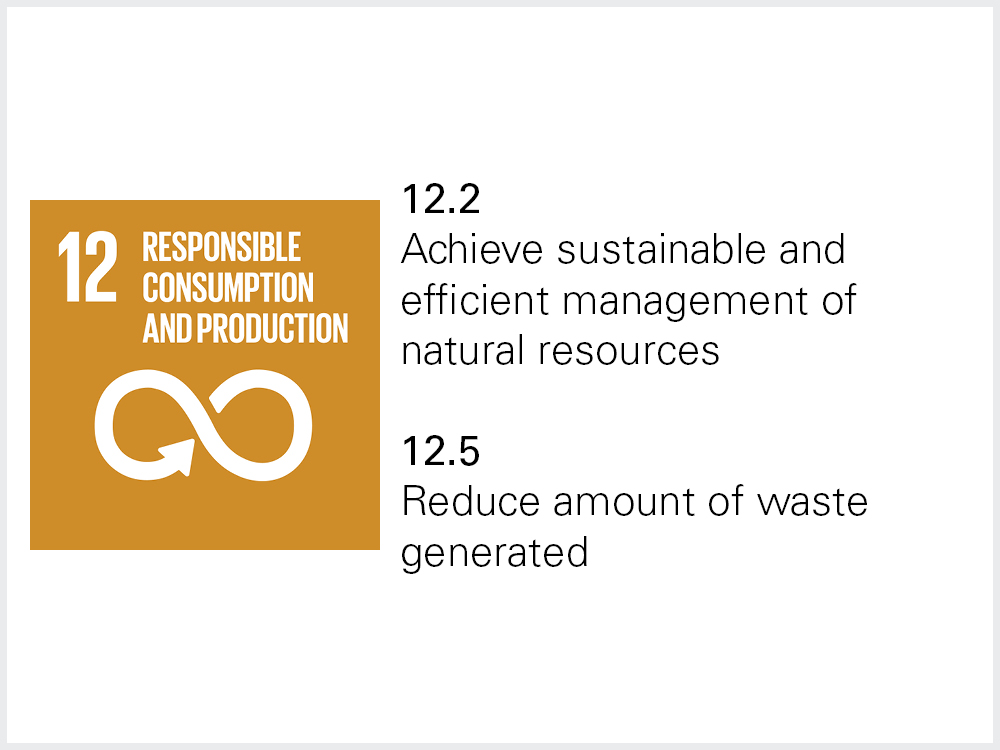Procurement & Recyclables

Waste monitoring was significantly improved in the past two years, and results showed an increase in recyclable materials. An additional pilot project successfully tested waste containers that digitally assessed amounts of the various materials in order to optimize placement of the containers in the building. With the goal of lengthening the useful life of IT devices, decommissioned electronics were sold to staff and students.
Increase in recyclable materials
Thanks to improved monitoring, it is now possible to determine the amounts of the various kinds of waste produced. In 2021 and 2022, the total amount of waste collected rose to 540 t and 576 t, respectively. This is due mostly to an increase in recyclable materials, which includes glass, paper, electronic/IT waste, metal, and PET. Amounts of non-recyclable materials remained about the same as in 2019. Non-recyclable materials include for example garbage and industrial garbage, bulky waste and some laboratory glass. These are generally disposed of thermally in the waste incinerator, thereby contributing to power generation.
Pilot project for improved waste monitoring
As part of a pilot project for more efficient recycling of materials, wastebaskets were removed from the building in Klingelbergstrasse 61 in 2022. Containers for various recyclable materials were then placed on every floor and equipped with a digital scale and monitoring system. Data on the amounts of waste collected can now be monitored via a dashboard. The goal was to place waste disposal containers in a targeted manner, in locations where they are most needed, in order to optimize recycling of materials. In the future the digital containers will be moved in order to conduct the monitoring in other buildings.

As a pilot study, the range of waste disposal options was expanded over several months in the building of the Faculty of Medicine and the University Sports Gym, and since then the amount of the various materials in the individual containers is being monitored. As a result, for example, one glass container was moved to a different floor, since there was a greater need for glass disposal there. The monitoring helps us optimize the containers provided.
Jakob Scheidt, Team Lead, Building Services
Hazardous waste
A total of about 72 tons of special waste was collected in 2021 and 59 tons in 2022. This includes solvents, chemical waste, biowaste and machine oils. About 90% of the total special waste was classified as hazardous. In 2022, the amount of biological hazardous waste decreased, as all liquid biowaste was able to be autoclaved1 and disposed of on site in the new Biozentrum.
Extended lifespan
In November 2022, the IT Service Center in Petersgraben organized a resale of decommissioned IT equipment to staff and students. Laptops, desktop computers and monitors that are no longer used by the university could be purchased and reused.
Procurement
Since 2021, the online shop for central office purchases has been open to all staff responsible for procurement. University of Basel researchers and administrative staff can also order needed materials directly from the “Store & Supply” warehouse in the new Biozentrum. Over 1,000 items including laboratory and office supplies, as well as chemicals, are available for pickup or delivery. Central procurement reduces packaging materials and transportation, thereby also reducing greenhouse gas emissions.
Goals & actions
Reduce special and hazardous waste
Integrate the topics of special waste, environmentally responsible disposal, and waste prevention into online courses on safety topics made available to (laboratory) staff
Safety & Security
Integrate sustainability into procurement
Develop and implement a continuing education workshop on sustainable procurement for members of the university community who are involved in procurement processes
Create and implement sustainability guidelines for delivery companies and service providers; integrate sustainability criteria in submissions and procurement
Sustainability Office
Facilities Controlling & Services
Sustainability Office
Facilities Controlling & Services
Improve data collection on recyclables
Implement waste monitoring in all relevant University of Basel buildings; set up central data collection for recyclables; publish in Sustainability Report every two years
Facilities
Campus Services
Sustainability Office
[1] Autoclaving is a form of steam sterilization, and is considered to be one of the most reliable sterilization methods.


